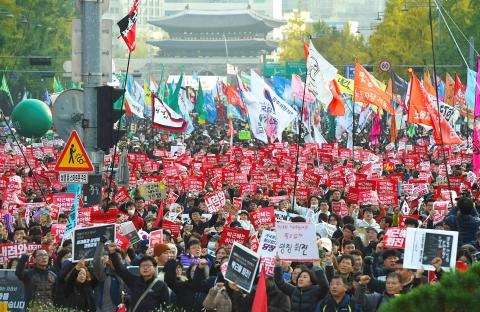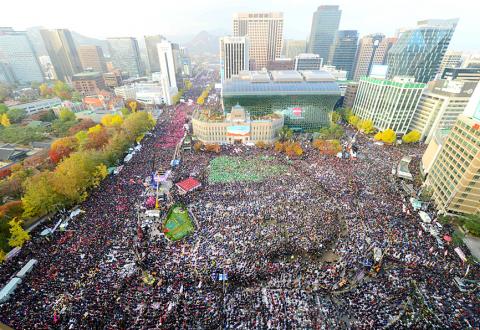Tens and possibly hundreds, of thousands of South Koreans yesterday marched in Seoul demanding the ouster of South Korean President Park Geun-hye in one of the biggest protests in the country since its democratization about 30 years ago.
Police anticipated about 170,000 people to turn out near City Hall and an old palace gate while the protest organizers estimated as much as 1 million are taking part.
It is the latest of a wave of massive rallies against Park, whose presidency has been shaken by suspicion that she let a shadowy longtime confidante to manipulate power from behind the scenes.

Photo: AFP
Park’s friend, Choi Soon-sil, the daughter of a late cult leader who emerged as Park’s mentor in the 1970s, is also suspected of exploiting her presidential ties to bully companies into donating tens of millions of US dollars to foundations she controlled.
Despite rising public anger, opposition parties have yet to seriously push for Park’s resignation or impeachment over fears of negatively impacting next year’s presidential race. However, they have threatened to campaign for resignation if she does not distance herself from state affairs.
The protest was expected to be the largest in the capital since June 10, 2008, when police said 80,000 people took part in a candlelight vigil denouncing the government’s decision to resume US beef imports amid persisting mad cow fears. Organizers then estimated the crowd at 700,000.

Photo: AFP
In the summer of 1987, millions of South Koreans rallied in Seoul and other cities for weeks before the then-military government caved in to demands for free presidential elections.
In an attempt to stabilize the situation, Park on Tuesday last week said she would let the opposition-controlled parliament choose her prime minister, but opposition parties said her words are meaningless without specific promises about transferring much of her presidential powers to a new second in charge.
Prosecutors have arrested Choi, one of her key associates and two former presidential aides who allegedly helped Choi interfere with government decisions and amass an illicit fortune at the expense of businesses.
Prosecutors on Friday also summoned the chairman of steelmaker POSCO over allegations that Choi and her associates tried to forcibly take over the shares of an advertisement company previously owned by the steelmaker.
On Tuesday last week, prosecutors raided the headquarters of smartphone giant Samsung Electronics, the country’s largest company, which is under suspicion of spending millions of US dollars illicitly financing the equestrian training of Choi’s athlete daughter.
Under South Korea’s criminal litigation law, which requires suspects to be either indicted or released within 20 days of their arrest, prosecutors have until Sunday next week to formally charge Choi. There is also a possibility that prosecutors will eventually investigate Park, who in a televised apology last week said she would accept a direct investigation into her actions.
The president has immunity from prosecution except in cases of treason, under South Korean law, but she can be investigated.
Park has 15 months left in her term. If she steps down before the end of it, an election must be held within 60 days.

GAINING STEAM: The scheme initially failed to gather much attention, with only 188 cards issued in its first year, but gained popularity amid the COVID-19 pandemic Applications for the Employment Gold Card have increased in the past few years, with the card having been issued to a total of 13,191 people from 101 countries since its introduction in 2018, the National Development Council (NDC) said yesterday. Those who have received the card have included celebrities, such as former NBA star Dwight Howard and Australian-South Korean cheerleader Dahye Lee, the NDC said. The four-in-one Employment Gold Card combines a work permit, resident visa, Alien Resident Certificate (ARC) and re-entry permit. It was first introduced in February 2018 through the Act Governing Recruitment and Employment of Foreign Professionals (外國專業人才延攬及雇用法),

RESILIENCE: Deepening bilateral cooperation would extend the peace sustained over the 45 years since the Taiwan Relations Act, Greene said Taiwan-US relations are built on deep economic ties and shared values, American Institute in Taiwan (AIT) Director Raymond Greene said yesterday, adding that strengthening supply chain security in critical industries, enhancing societal resilience through cooperation and deepening partnerships are key to ensuring peace and stability for Taiwan in the years ahead. Greene made the remarks at the National Security Youth Forum, organized by National Taiwan University’s National Security and Strategy Studies Institution in Taipei. In his address in Mandarin Chinese, Greene said the Taiwan-US relationship is built on deep economic ties and shared interests, and grows stronger through the enduring friendship between

CAUTION URGED: Xiaohongshu and Douyin — the Chinese version of TikTok — are tools the Chinese government uses for its ‘united front’ propaganda, the MAC said Mainland Affairs Council (MAC) Minister Chiu Chui-cheng (邱垂正) yesterday urged people who use Chinese social media platforms to be cautious of being influenced by Beijing’s “united front” propaganda and undermining Taiwan’s sovereignty. Chiu made the remarks in response to queries about Chinese academic Zhang Weiwei (張維為) saying that as young Taiwanese are fond of interacting on Chinese app Xiaohongshu (小紅書, known as RedNote in English), “after unification with China, it would be easier to govern Taiwan than Hong Kong.” Zhang is professor of international relations at Shanghai’s Fudan University and director of its China Institute. When giving a speech at China’s Wuhan

ENHANCE DETERRENCE: Taiwan has to display ‘fierce resolve’ to defend itself for China to understand that the costs of war outweigh potential gains, Koo said Taiwan’s armed forces must reach a high level of combat readiness by 2027 to effectively deter a potential Chinese invasion, Minister of National Defense Wellington Koo (顧立雄) said in an interview with the Chinese-language Liberty Times (sister newspaper of the Taipei Times) published yesterday. His comments came three days after US Secretary of State Marco Rubio told the US Senate that deterring a Chinese attack on Taiwan requires making a conflict “cost more than what it’s worth.” Rubio made the remarks in response to a question about US policy on Taiwan’s defense from Republican Senator John Cornyn, who said that Chinese